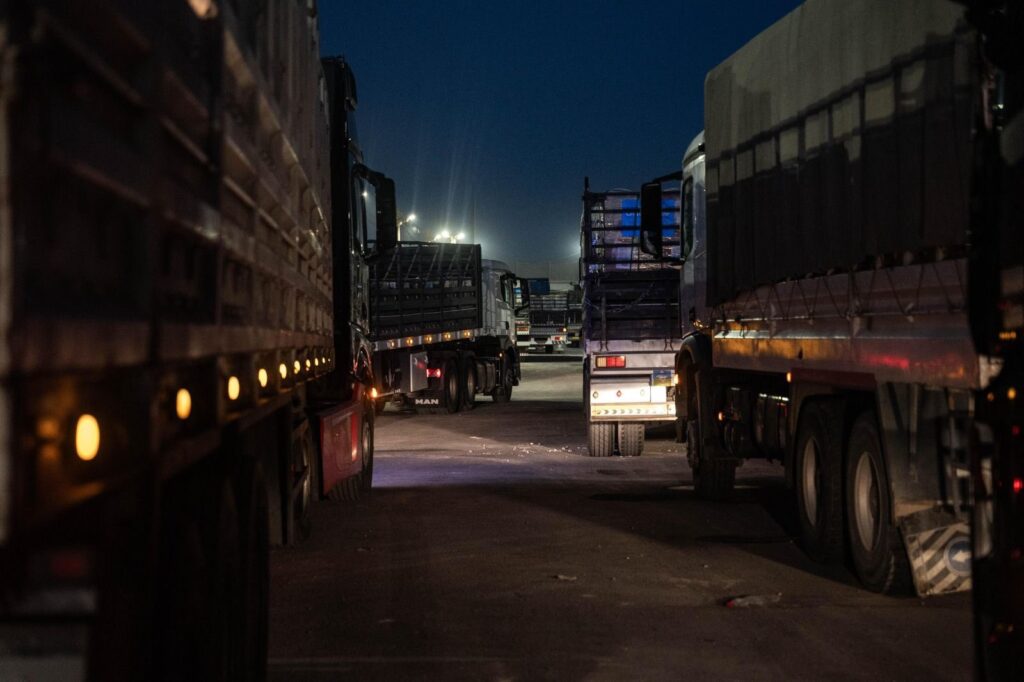Australia/Israel Review
ICC’s accusations against Israel are unfounded
Dec 17, 2024 | David Adesnik

The International Criminal Court (ICC) issued a warrant on November 21 for the arrest of Israeli Prime Minister Binyamin Netanyahu and his former defence minister, Yoav Gallant. In doing so, the Court has betrayed its mandate by levelling transparently false charges in a case in which it has no jurisdiction.
When ICC Prosecutor Karim Khan initially applied for the warrants in May, the lead accusation he made against Netanyahu and Gallant was the “starvation of civilians as a method of warfare.” Yet, as he wrote those words, a surge of aid was pouring into Gaza.
In the aftermath of the October 7 massacre, Israeli authorities suspended the delivery of aid into Gaza as they sought to regain their composure amid a devastating surprise attack. But aid soon resumed, and United Nations data showed an increasing number of trucks delivering their goods for three months straight.
But in February 2024, there was a sudden drop. Despite their mutual antagonism, UN agencies and Israeli authorities worked to improve the situation. Whereas 2,874 trucks reached Gaza in February, the number rose to 4,993 in March and 5,671 in April.
Despite this surge, warnings multiplied that Gaza was on the brink of disaster. What drove this fear was an assessment by the UN-backed famine monitor known as the Integrated Food Security Phase Classification, or IPC. For experts around the world, the IPC is the gold standard in famine monitoring. In mid-March, the IPC warned that “Famine is imminent” and would strike Gaza within two months.
The IPC employs a very specific definition of famine, which includes excess mortality of “at least two deaths per 10,000 people/day,” meaning that, if it were to strike in Gaza, there would be hundreds of deaths each day just from hunger, not violent conflict.
As the two-month forecast window drew to a close, it became clear that there was no famine. The Hamas-run Government Media Office in Gaza has reported 41 total deaths from malnutrition throughout the war. Those were tragic losses, but not evidence of Israeli malice.
In May, the IPC’s Famine Review Committee found that there had not been enough evidence to conclude that the situation in Gaza met the criteria for a famine. In late June, it issued a new quarterly assessment stating that, “The amount of food and non-food commodities allowed into the northern governorates increased,” and that, “The available evidence does not indicate that famine is currently occurring.”
Back in March, the IPC found that 30% of Gaza residents were experiencing the most severe type of deprivation, rating a five on the IPC’s five-point scale. By mid-October, it was down to 6%.
One has to read IPC publications with a magnifying glass to find any hint of why its forecasts proved to be so wrong. Its October report referred in passing to a “temporary surge of humanitarian assistance,” with no indication of who was responsible. Western media mainly reported the IPC’s persistent warnings that conditions could take a turn for the worse at any moment.
This brings us back to the ICC and its claim that Israel has been deliberately starving the people of Gaza. Aid organisations frequently complain that Israeli authorities delay their shipments, turn their trucks back at the last moment and impose onerous paperwork requirements. Yet Israeli data show that over 58,000 trucks have brought cargo into Gaza since the beginning of the war, delivering more than 1.1 million tons of goods.
The full contents of the ICC warrants are secret, yet the ICC’s summary of the charges alleges that Netanyahu and Gallant’s “conduct led to the disruption of the ability of humanitarian organizations to provide food and other essential goods to the population in need in Gaza.” The facts say otherwise.
Although it is not the only charge against Netanyahu and Gallant, the alleged Israeli starvation campaign is the focal point of the ICC’s accusations. There is no way to separate the weakness of this charge from the weakness of the entire case, which exposes how politicised the court has become.
Israel, like the United States, is not a party to the Rome Statute and therefore not subject to the Court’s jurisdiction. To pursue an investigation of Israeli leaders, the Court had to stretch its mandate to the breaking point, asserting that it has jurisdiction because Israeli actions took place within the “State of Palestine”.
Some might see this as legal innovation for a noble purpose, yet there is a double standard at play. The ICC has issued no warrants for the Chinese leaders responsible for the cultural genocide of their country’s Uyghur Muslim minority.
There is no warrant for Bashar Assad, whose regime tortured and slaughtered hundreds of thousands of Syrians. Nor has the Court pursued Iranian Supreme Leader Ali Khamenei, whose regime supports Assad, Hamas and numerous other violent terrorist organisations. None of those are members of the ICC – but neither is Israel. Yet it’s only the Jewish state that the ICC has chosen to target by stretching its mandate via questionable legal innovations.
David Adesnik is the Vice-President of Research at the Foundation for Defense of Democracies (FDD) in Washington, DC. A version of this article appeared in Canada’s National Post. © FDD (fdd.org), reprinted by permission, all rights reserved.
Tags: Gaza, International Criminal Court, Israel






